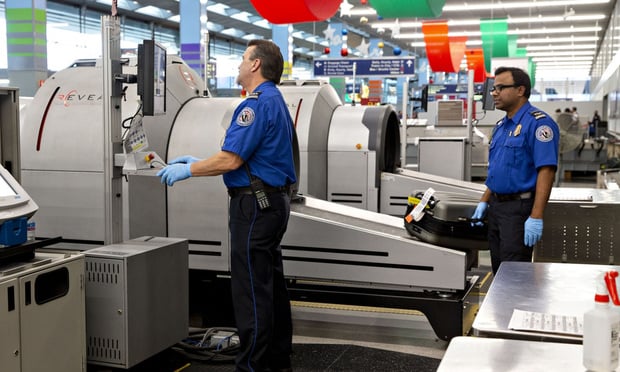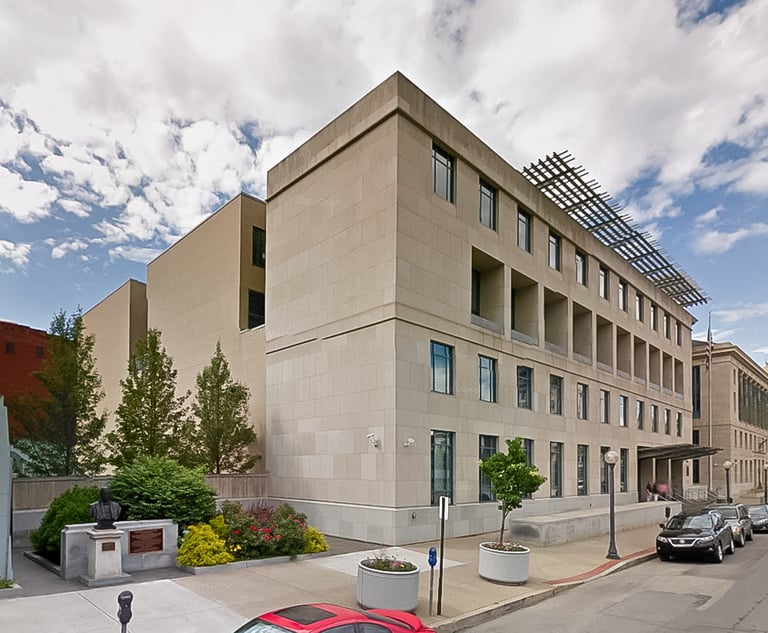Suit Against TSA Screener to Proceed After DOJ Drops Bid for SCOTUS Review
With the extended Dec. 30 deadline now passed, the Third Circuit's precedent stands, and the lawsuit, which is over a security search gone awry at the Philadelphia International Airport, is set to proceed.
January 08, 2020 at 03:18 PM
4 minute read
 Transportation Security Administration agents work in a checked-bag screening area at O'Hare International Airport in Chicago on Jan. 8, 2019. Photo: Daniel Acker/Bloomberg
Transportation Security Administration agents work in a checked-bag screening area at O'Hare International Airport in Chicago on Jan. 8, 2019. Photo: Daniel Acker/Bloomberg
The dispute that prompted a federal appeals court to open up an avenue to civil liability based on claims of overly aggressive treatment by the Transportation Security Administration is set to go to trial, after the U.S. Department of Justice chose not to file a writ of certiorari with the U.S. Supreme Court.
Late last year, U.S. Solicitor General Noel Francisco asked the high court for an extension to see whether the office would like to appeal a precedential, en banc ruling from the U.S. Court of Appeals for the Third Circuit in Pellegrino v. U.S. Transportation Security Administration. In that decision the court held that TSA screeners could be held liable in a civil action for their conduct.
With the extended Dec. 30 deadline now passed, the Third Circuit's precedent stands, and the lawsuit, which is over a security search gone awry at the Philadelphia International Airport, is set to proceed.
In August, a split en banc panel determined that transportation security officers are "investigatory, or law enforcement officers" under the Federal Tort Claims Act, which waives the government's immunity for certain torts committed by "investigative or law enforcement officers."
The ruling, written by Judge Thomas Ambro, focused on the plain meaning of the statute.
"Words matter. This core tenet of statutory interpretation channels our conclusion today: TSOs are 'investigative or law enforcement officers' as defined in the Tort Claims Act at 28 U.S.C. Section 2680(h)," Ambro said. "They are 'officers of the United States' by dint of their title, badge, and authority. They are 'empowered by law to execute searches' because, by statutory command and implementing regulation, they may physically examine passengers and the property they bring with them to airports."
That decision diverged from a three-judge panel ruling from 2018, which held that the screeners were not law enforcement officers and barred recovery for the claims.
According to court papers, the incident that touched off the Pellegrino litigation occurred in 2006, when Nadine Pellegrino and her husband were planning to catch a flight to Florida from the Philadelphia airport. When a TSA screener began searching her bags, Pellegrino asked for a private search.
TSA screener Nuyriah Abdul-Malik did the private search, which Pellegrino has alleged was "unnecessarily rough and invasive," and caused damage to some of her belongings, court papers said. The interaction deteriorated, court papers said, and when Pellegrino left the room, she allegedly struck Abdul-Malik with a bag.
The TSA screener pressed charges, and Pellegrino was charged with felony aggravated assault, possession of instruments of crime, reckless endangerment, simple assault and making terroristic threats, the court noted. At Pellegrino's trial, however, Abdul-Malik, no longer a TSA employee, did not appear, so Pellegrino was found not guilty.
After the trial, in 2008, Pellegrino submitted a claim for $951,000 in damages to the TSA, which was denied. Then in 2009, she brought a civil rights action in the U.S. District Court for the Eastern District of Pennsylvania. The district court ruled in the government's favor on all claims, except one property damage claim, which the parties settled.
In holding that the screeners should be subject to liability, Ambro declined to look beyond the statute.
"Congress has created a remedy; we are simply giving effect to the plain meaning of its words," Ambro said.
Pellegrino's case is now set to proceed against the TSA. On Jan. 3, counsel for Pellegrino sent U.S. District Judge J. Curtis Joyner of the Eastern District of Pennsylvania a letter requesting a status conference on the next steps.
Paul Thompson of McDermott Will & Emery, who is representing Pellegrino, did not return a call seeking comment. A DOJ spokeswoman said the office had no comment on the pending litigation.
This content has been archived. It is available through our partners, LexisNexis® and Bloomberg Law.
To view this content, please continue to their sites.
Not a Lexis Subscriber?
Subscribe Now
Not a Bloomberg Law Subscriber?
Subscribe Now
NOT FOR REPRINT
© 2025 ALM Global, LLC, All Rights Reserved. Request academic re-use from www.copyright.com. All other uses, submit a request to [email protected]. For more information visit Asset & Logo Licensing.
You Might Like
View All


3rd Circuit Strikes Down NLRB’s Monetary Remedies for Fired Starbucks Workers

Middle District of Pennsylvania's U.S. Attorney Announces Resignation
2 minute readLaw Firms Mentioned
Trending Stories
- 1Antitrust Partner Plans Move to Davis Polk From Fried Frank
- 2How This Dark Horse Firm Became a Major Player in China
- 3Bar Commission Drops Case Against Paxton—But He Wants More
- 4Pardons and Acceptance: Take It or Leave It?
- 5Gibbons Reps Asylum Seekers in $6M Suit Over 2018 ‘Inhumane’ Immigration Policy
Who Got The Work
J. Brugh Lower of Gibbons has entered an appearance for industrial equipment supplier Devco Corporation in a pending trademark infringement lawsuit. The suit, accusing the defendant of selling knock-off Graco products, was filed Dec. 18 in New Jersey District Court by Rivkin Radler on behalf of Graco Inc. and Graco Minnesota. The case, assigned to U.S. District Judge Zahid N. Quraishi, is 3:24-cv-11294, Graco Inc. et al v. Devco Corporation.
Who Got The Work
Rebecca Maller-Stein and Kent A. Yalowitz of Arnold & Porter Kaye Scholer have entered their appearances for Hanaco Venture Capital and its executives, Lior Prosor and David Frankel, in a pending securities lawsuit. The action, filed on Dec. 24 in New York Southern District Court by Zell, Aron & Co. on behalf of Goldeneye Advisors, accuses the defendants of negligently and fraudulently managing the plaintiff's $1 million investment. The case, assigned to U.S. District Judge Vernon S. Broderick, is 1:24-cv-09918, Goldeneye Advisors, LLC v. Hanaco Venture Capital, Ltd. et al.
Who Got The Work
Attorneys from A&O Shearman has stepped in as defense counsel for Toronto-Dominion Bank and other defendants in a pending securities class action. The suit, filed Dec. 11 in New York Southern District Court by Bleichmar Fonti & Auld, accuses the defendants of concealing the bank's 'pervasive' deficiencies in regards to its compliance with the Bank Secrecy Act and the quality of its anti-money laundering controls. The case, assigned to U.S. District Judge Arun Subramanian, is 1:24-cv-09445, Gonzalez v. The Toronto-Dominion Bank et al.
Who Got The Work
Crown Castle International, a Pennsylvania company providing shared communications infrastructure, has turned to Luke D. Wolf of Gordon Rees Scully Mansukhani to fend off a pending breach-of-contract lawsuit. The court action, filed Nov. 25 in Michigan Eastern District Court by Hooper Hathaway PC on behalf of The Town Residences LLC, accuses Crown Castle of failing to transfer approximately $30,000 in utility payments from T-Mobile in breach of a roof-top lease and assignment agreement. The case, assigned to U.S. District Judge Susan K. Declercq, is 2:24-cv-13131, The Town Residences LLC v. T-Mobile US, Inc. et al.
Who Got The Work
Wilfred P. Coronato and Daniel M. Schwartz of McCarter & English have stepped in as defense counsel to Electrolux Home Products Inc. in a pending product liability lawsuit. The court action, filed Nov. 26 in New York Eastern District Court by Poulos Lopiccolo PC and Nagel Rice LLP on behalf of David Stern, alleges that the defendant's refrigerators’ drawers and shelving repeatedly break and fall apart within months after purchase. The case, assigned to U.S. District Judge Joan M. Azrack, is 2:24-cv-08204, Stern v. Electrolux Home Products, Inc.
Featured Firms
Law Offices of Gary Martin Hays & Associates, P.C.
(470) 294-1674
Law Offices of Mark E. Salomone
(857) 444-6468
Smith & Hassler
(713) 739-1250





